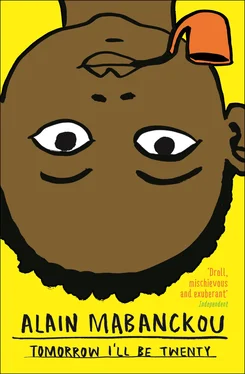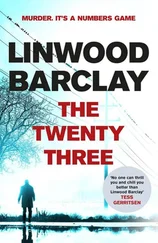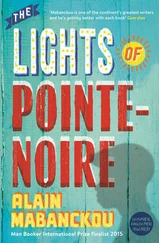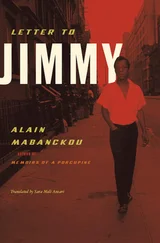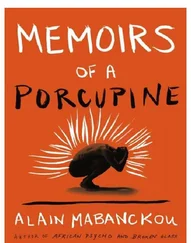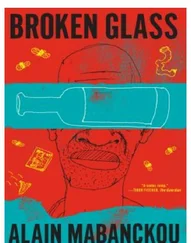The photo of Victor Hugo’s gone. I can’t ask Uncle René — children mustn’t speak at table unless a grown up asks them a question.
‘Michel, have you noticed anything about the wall opposite you?’
It’s Uncle René asking.
I look up, and pretend to be thinking while I move my fork about, and I murmur: ‘No, I haven’t noticed anything.’
‘Nothing? Look up properly!’
So I say: ‘The photo of Monsieur Victor Hugo’s gone…’
Auntie Marie-Thérèse gives me a nasty look. She tells me that when someone is dead you don’t call him Monsieur any more, because they’re no longer around to oblige us to respect them. But for me all these people in the photos are alive. They’ve been watching me eat since I was really small. So they’re Monsieurs.
Uncle René is pleased with my answer. ‘Bravo! Bravo! Bravo nephew! Your cousins hadn’t even noticed!’
And we carry on eating, each with his nose in his own plate. I try to follow the rhythm. When they eat fast, I eat fast. When they slow down, I slow down. When they pause for moment, I pause too.
Edwige is on my left, Kevin is on my right. Opposite are Auntie Marie-Thérèse and Sebastien. Uncle René is like a president, because from where he sits he can keep an eye on all of us without moving his head or leaning forward. Kevin and Sebastien eat like pigs, you’d think they were in a race. Auntie Marie-Thérèse’s not pleased with them, she thinks they should slow down.
My uncle comes back to the subject of Victor Hugo, who’s been taken down from the wall: ‘Michel do you know why I took down the picture of Victor Hugo?’
I shake my head.
He stares hard at the wall and begins: ‘For years I loved that French poet stuck up there on the wall. He’s a man of genius, Victor Hugo, he represents in one man the entire nineteenth century, not to say our own century. I would almost say that he’s the only poet I love in the way I love Karl Marx, Engels, Lenin and the immortal Marien Ngouabi. But I’m going to show you something very serious now, which made me take down his photo from the wall.’
He stops eating, stands up and goes into the bedroom. None of us know what’s going on. What’s serious? What’s he got against poor Victor Hugo, who’s never done anything and who even wrote lots of poems you can recite out loud. We all wonder: Are we meant to stop eating too, or should we carry on without Uncle René, when there’s something seriously up in the house?
Auntie Marie-Thérèse signals to us to stop. Edwige and I stop eating, but my two cousins carry on. Auntie Marie-Thérèse shouts at them: ‘I said STOP!!!’
Sebastien had time to stuff a fat chicken wing into his mouth, and he’s still chewing.
Now Uncle René’s back. In his hand he has a very crumpled piece of paper, which he’s smoothing out. ‘I have photocopied the speech Victor Hugo made on Africa. He gave it during a banquet over which he presided in 1879. Sitting close to him was Victor Schoelcher, someone who fought for the end of slavery. And do you know what Victor Hugo said on that occasion?’
He puts on his spectacles, the kind that make him look like a doctor about to give a child an injection, and starts reading in the way the members of the Congolese Workers’ Party do when they make a speech: ‘“Oh what a land is Africa! Asia has its history, America has its history, even Australia has its history; Africa has no history.”’
He pauses for breath, as though he’s just won a swimming race in front of the dictator Idi Amin Dada. But we can see he’s skipping bits as he reads, that he’s picking what he wants to read to us. Why doesn’t he read it all out so we can go on eating our chicken in peace? When he pauses for breath he looks like a buffalo that’s escaped from some white hunters. Why didn’t he realise all this before he stuck up the photo of Victor Hugo on his wall? And if someone only reads out a little bit of something, and doesn’t give you the bit that comes after, how are you expected to put this bit together with the whole thing and understand what’s really been said?
He’s off again: ‘“Put all your surplus into Africa, and solve all your social problems, turn your proletariats into proprietors. Go on, do it! Build roads, build ports, build towns; expand, exploit, colonise, increase; and may the divine Spirit find its expression in peace on this earth, and The Human Spirit likewise, in freedom, far from the influence of priests and princes.”’
‘That’s enough, René, the children are here to eat and celebrate Christmas, not to listen to things that don’t concern them! And what happens if one day you discover that your comrades Marx, Engels and Lenin have said things you don’t like about Africa?’
Auntie Marie-Thérèse is the only person in the world who can talk like that to Uncle René. I don’t know how she does it because she’s not a big woman, not like Longombé’s mother or even Madame Mutombo. She’s very slim and short and her voice is like the voice of a little girl who’s afraid of boys. I can’t believe she talks like that to my uncle and that my uncle actually stops reading from the piece of paper about Victor Hugo. She must have some secret to be able to talk like that without my uncle getting angry.
Uncle René folds away his paper, looks at the space where Victor Hugo’s photo used to be. Now there’s just a square gap on the wall. Inside the square it’s a bit lighter than the rest of the wall. You can tell there used to be a photo there.
‘In any case’, he says, ‘tomorrow the boy will paint that wall, and then no one will ever know that Victor Hugo used to live here. I’ll put up a photo of Ho Chi Minh or Che Guevara in its place.’
Uncle René wasn’t angry when he saw the toys had already been unwrapped. I thought he would be because he’s often the one who says when we should rip the wrapping off our presents. Even if I do get the same present every year, I take my present out of my bag and rip off the wrapping and pretend to be happy. That’s why today, since I’m not visibly happy, he asks, ‘Do you like your truck and your shovel and rake?’
I don’t say anything, I just stare at Sebastien’s car. Uncle René knows what I’m thinking and he adds, ‘If you get your primary school certificate this year you’ll get a car like Sebastien’s. But you must come in the top five in the country!’
Has Sebastien got his school certificate? No, he’s younger than me. So why did he get a car before he got his certificate, when I have to wait to get mine?
We play outside, behind the house. Edwige is in her room listening to music with the tape recorder Uncle René’s given her. I mustn’t tell them we got a tape recorder before Edwige. That’s our secret. Papa Roger has said we must be discreet. We can listen to Roger Guy Folly talking every evening from America. Edwige’s tape recorder is only for putting cassettes into, and listening to music. That’s all. And also, Edwige doesn’t have the cassette of the singer with the moustache weeping for his alter ego from dawn till dusk. Why would I be impressed with her present?
Miguel’s watching us from a distance. He’s tired of being tied up to the sour sap tree. He lies resting, one eye shut, the other half open. I feel sorry for him because he didn’t get any Christmas presents. He’s always getting forgotten, when in fact he’s the one who protects Uncle René’s riches. I wish I could give him my shovel or my rake. The problem is, if I give them to him he’ll probably bark, because dogs can’t be farmers, they don’t know that agriculture is the future of development in this country. They can’t hold a rake and shovel with their paws. They’re not to know you always put the ox before the cart. So there’s no point my giving my shovel or my rake to Miguel.
Читать дальше
